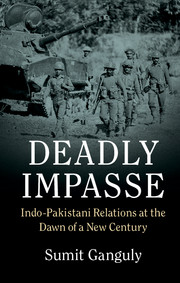Book contents
- Frontmatter
- Dedication
- Contents
- List of maps
- Preface and acknowledgments
- List of abbreviations
- 1 The rivalry revisited
- 2 Kargil and after
- 3 The troubled decade in Kashmir
- 4 The road to Operation Parakram
- 5 The composite dialogue and beyond
- 6 An extension of the rivalry
- 7 Policy implications
- In lieu of an epilogue
- Appendices
- Appendix A The Karachi Agreement
- Appendix B The Tashkent Declaration
- Appendix C The Shimla Agreement
- Appendix D The Lahore Declaration
- Appendix E The India-Pakistan Non-Attack Agreement
- Appendix F Charts, data and calculations by Jack Renner
- Appendix G Maps
- References
- Index
Appendix A - The Karachi Agreement
from Appendices
Published online by Cambridge University Press: 05 March 2016
- Frontmatter
- Dedication
- Contents
- List of maps
- Preface and acknowledgments
- List of abbreviations
- 1 The rivalry revisited
- 2 Kargil and after
- 3 The troubled decade in Kashmir
- 4 The road to Operation Parakram
- 5 The composite dialogue and beyond
- 6 An extension of the rivalry
- 7 Policy implications
- In lieu of an epilogue
- Appendices
- Appendix A The Karachi Agreement
- Appendix B The Tashkent Declaration
- Appendix C The Shimla Agreement
- Appendix D The Lahore Declaration
- Appendix E The India-Pakistan Non-Attack Agreement
- Appendix F Charts, data and calculations by Jack Renner
- Appendix G Maps
- References
- Index
Summary
Karachi Agreement
July 27, 1949
INTRODUCTION
A. The military representatives of India and Pakistan met together in Karachi from 18 July to 27 July 1949 under the auspices of the Truce Sub-Committee of the United Nations Commission for India and Pakistan.
B. The members of the Indian delegation were: Lieutenant-General S.M. Shrinagesh, Major-General K.S Thimayya, Brigadier S.H.F.J. Manekshaw. As observers: Mr. H.M. Patel, Mr. V. Sahay.
C. The members of the Pakistan delegation were: Major-General W.J. Cawthorn, Major-General Nazir Ahmad, Brigadier M. Sher Khan. As observers: Mr. M. Ayub, Mr. A. A. Khan.
D. The members of the Truce Sub-Committee of the United Nations Commission for India and Pakistan were: Mr. Hernando Samper (Colombia), Chairman; Mr. William L.S. Williams (United States); Lieutenant-General Maurice Delvoie, Military Adviser, Mr. Miguel A. Marin, Legal Adviser.
AGREEMENT
A. Considering:
That the United Nations Commission for India and Pakistan, in its letter dated 2 July, 1949, invited the Governments of India and Pakistan to send fully authorized military representatives to meet jointly in Karachi under the auspices of the Commission's Truce Sub-Committee to establish a cease-fire line in the State of Jammu and Kashmir, mutually agreed upon by the governments of India and Pakistan;
That the United Nations Commission for India and Pakistan in its letter stated that “The meeting will be for military purposes; political issues will not be considered,” and that “They will be conducted without prejudice to negotiations concerning the Truce Agreement”;
That in the same letter the United Nations Commission for India and Pakistan further stated that “The cease-fire line is a complement of the suspension of hostilities, which falls within the provisions of Part I of the Resolution of 13 August, 1948 and can be considered separately from the questions relating to Part II of the same Resolution”;
That the Governments of India and Pakistan, in their letters dated 7 July, 1949 to the Chairman of the Commission, accepted the Commission's invitation to the military conference in Karachi;
B. The Delegations of India and Pakistan, duly authorized, have reached the following agreement:
1. Under the provision of Part I of the Resolution of 13 August, 1948, and as a complement of the suspension of hostilities in the State of Jammu and Kashmir on 1 January, 1949, a cease-fire line is established.
- Type
- Chapter
- Information
- Deadly ImpasseIndo-Pakistani Relations at the Dawn of a New Century, pp. 134 - 139Publisher: Cambridge University PressPrint publication year: 2016

